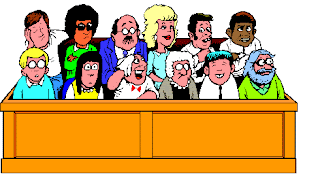Over
the weekend, I read a book that, in part, deals with the question: What is trust? And as I read the book,
I was reminded of an article I read months ago about Chelsea Clinton’s wedding.
Chelsea
had her wedding at the historic Astor Courts in Rhinebeck, NY. The article I
read revealed that Chelsea used the house across the street from Astor Courts
as a staging area. The newsperson that penned the article wrote, “There’s an
awful lot of trust amongst the Clintons that the neighbors won’t talk about the
wedding.”
That
struck me. The Clinton’s went to a stranger for a favor and TRUSTED that they
would be discreet. What kind of people would ever trust a complete stranger? The
Clintons, that’s who.
The
book I’m reading (The Rational Optimist:How Prosperity Evolves by Matt Ridley) talks about the fact that for human
beings to excel and surpass other animals, we had to learn to trust.
I
don’t want to get into a debate about evolution here, so let’s ignore apes
entirely and say that we evolved from cavemen to the superior species we are
today. We had to learn how to trust. The group of us who became what we are
today actually started to trade, which is something that other animals do not
do. Maybe these evolved cavemen would trade a banana for a stool. To make this
trade, they had to trust their fellow caveman.
This
concept of trust sets us apart.
Now,
or course, when you trade, you don’t always get something of equal value. But
what it does require is an exchange where both parties are receiving something
that is of more value than what they are giving. Let’s say, for instance, that
you have blisters on your feet that hurt so bad you’d give anything for a
stool. Let’s also say that I haven’t had a meal in days and am a skeleton of a
man, so I’d give anything for a banana. I have a stool; you have a banana. It’s
a win-win because we both want what the other has more than what we have.
So
what is trust?
Trust
is the belief that another person’s word is good. It’s the belief that I will,
indeed, give you my stool when you hand over your banana. It’s the believe that
when you give me your banana, I won’t turn around and say, “Hah! Sucker. Now I
have your banana. Whatcha gonna do about it?”
Remember
the movie Wall Street? Michael
Douglas plays a famous character in cinematic history named Gordon Gecko. Gecko
is right up there with Travis Bickle, Batman, and, of course, Ms. Piggy. Gecko
is famous for giving some advice to college students: “Greed is good.”
But
Gecko misses an important point. He assumes that there are winners and there
are losers. He goes by the theory of zero-sum game. You are winning of others
lose. You are losing if others win.
But
that’s not what happens in real life. There are some zero-sum games, sure, but
the reality of human society is that greed is good, but it’s never a zero sum
game. We are giving something and we are getting something.
This
relates to all of us. When we provide a service for a client, we are giving
value. It may not even be material value. It might even be a feeling that we
give people. (I usually give people the feeling of happiness … or the willies).
Maybe
we fix their car or file their tax returns and, in exchange, we get paid and—if
we do a good job—perhaps a kind word.
If
you treat your clients like they are in a zero-sum game with you, you will
eventually go out of business. But if you both trust each other, and if you
work hard to make sure you earn trust by providing something your client truly
values, your clients will always turn to you to provide value.
Today’s
challenge: Consider the answer to the question: What is trust? Be impeccable
with your word in your dealings with everyone today.
Related Posts:
What is an Entrepreneur?
Brain Freeze: How Can I Make Better Decisions?
Related Posts:
What is an Entrepreneur?
Brain Freeze: How Can I Make Better Decisions?


